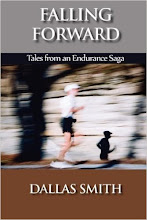On the day after the Boston Marathon bombing of April 15, 2013, Anita and Lynn Burnett walked up to visit with my daughter Jill and me. Their hotel and ours were both in the secured area soldiers had established immediately after the blast. That area encompassed several blocks downtown, enclosing office buildings, restaurants, hotels, and Prudential Center, a high-rise shopping center.
Overnight, my vision, degraded to incapacity by the marathon’s rigors, had returned to normal. Meanwhile, Lynn had become a celebrity. A Nashville TV station, realizing a local Tennessee runner had finished barely before the blast, called him up and interviewed him on-air. Following that, his Facebook page filled with friend requests.
We decided to take a walk outside the secured area and went through a checkpoint just outside the hotel that was manned by soldiers carrying M-16s. The soldiers requested proof in the form of room keys that we were duly lodged in the hotel. We didn't have a room key. Jill and I had just checked out because we were heading back to Tennessee later in the day. We had stored our luggage there to pick up later, and I had the hotel receipt for it. Soldiers inspected the paper and let us pass. It likely didn't hurt that Lynn and I, two guys standing there skinny as runners, were wearing our Boston Marathon jackets.
We walked along in the Back Bay neighborhood, an area of neatly kept row houses and brownstones. It was like a Sunday morning, quiet, peaceful, and idyllic. But you could see barriers across the streets leading downtown where the bombing had happened the day before.
We drifted along. The walk was good and what Lynn and I needed to help our legs recover. Suddenly a young woman came out of a house. She'd seen our jackets. She walked up to Lynn and me and handed each of us a long-stemmed red rose.
"I want to thank you for coming to Boston to run the marathon," she said.
Despite what you may've heard about the gruff temperament of Bostonians, the woman's act was in total keeping with the kindness extended to me by Boston citizens over the years during my trips there.
We walked on, Lynn and I clutching our roses, touched by the woman's kind gesture. After a while, we came to a side street barricade manned by two soldiers. I walked up to the barricade and reached my rose across it to one of the soldiers, saying,
"A woman gave me this rose and thanked me for coming and running the marathon. I want to give it to you now to thank you for your service."
The young soldier accepted the rose with a smile. Following my lead, Lynn gave his rose to the second soldier. We walked on, leaving the two soldiers standing behind the barrier holding their roses and their rifles.
I don't know; memory can be inaccurate. It is a patchwork of images, sounds, and scenes, of things said and not said. It is plastic and can be molded by later events and the passage of time.
Nonetheless, the enduring image I hold onto is that of the two soldiers standing there clutching their roses and cradling their rifles. We four walked on and passed out of that scene and out of that story, and came back to our lives in Tennessee.
The families ripped and torn apart by the cruel violence of the bomb that day can never walk out of that scene and out of that story. For them, it is forever yesterday.




